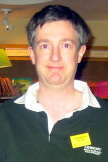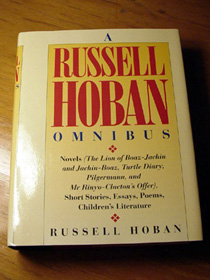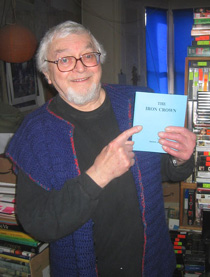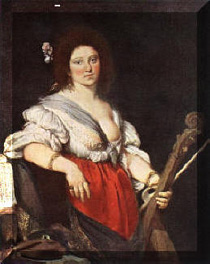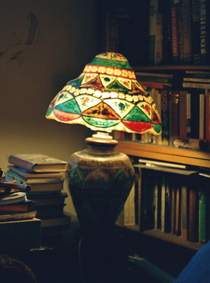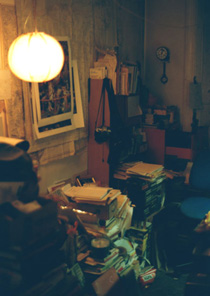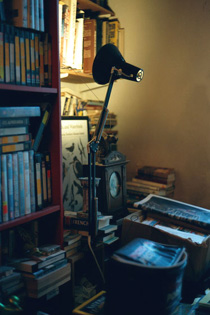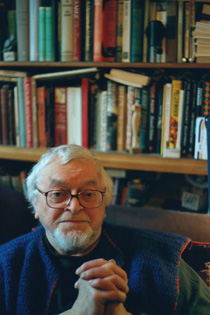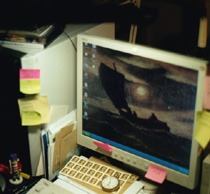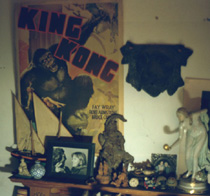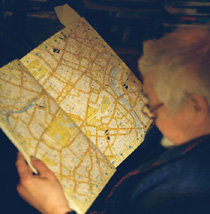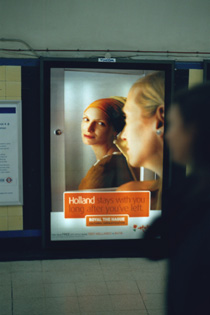CATCHING THE OMNIBUSES
Recollections of a visit to Russ
by Anthony Davis
I went to see Russ after some time spent at Tate Modern on Sunday 6 March 2005,
an interesting - if hurried - view into what were, in some ways, the very
different worlds of Joseph Beuys and August Strindberg. Little did I know, when
I turned up at around 4.50 p.m. (open house had been declared from 4.30 to 6.00
p.m.), that I’d risked losing the only other chair in Russ’ ‘study’ to The
Mysterious Helen - or to some male visitor, whose name was mysteriously Central
European, but which I have otherwise failed to register. In the event, neither
of these others, much to Russ’ later intrigue, managed to turn up to claim a
Hoban Omnibus in person on the last day designated for so doing - I have heard
that Russ is highly jealous of his time, and he seemed dismayed at their failure
to collect - and we ended up sharing roughly an hour-and-a-half, and much of the
bottle of red wine that he opened for us, alone.
It was with the pile of five Omnibuses in the cramped hallway (I was collecting
for two other Hobanites, who had come into my life through the convention - and
who, not for want of desiring to be, couldn’t be there) that my visit began.
Russ and I first established that I did not know either of the other two who
were due to attend (whose volumes awaited them with the small oblong size of
identifying Post-It® stickers on the front of the dust-jacket - no,
surprisingly, they were not yellow, but in a dark orange!), and then, as Roland
would say, I caught the remaining Omnibuses into the air. (Courtesy of Roland
and Linda, you can see Russ performing the like procedure - on an earlier
occasion - with a similarly seminal volume, this time under the imprint of
Cambridge Silent Artists, publishers of the convention booklet!)
At the foot of the stairs, my having negotiated the first obstacle in the house,
I invited Russ to consider the bottle of 15-year-old Laphroaig® that I had put
in his hand at the door, saying that I had picked it as a gift for him because
it was an ‘interesting 15-year-old’. Quickly (and with a face that in poker
would have given nothing of his hand away), Russ replied in a sort of
matter-of-fact way, which challenged me as to whether I was going to ask if he
was also talking about whisky, ‘What 15-year-old isn’t?’. (He may not have been,
but I didn’t choose to seek to establish this fact.)
Before I could bundle the books into a waiting receptacle (and ignoring the
temptation to make any joke about a trio of buses), Russ invited me to look at
all of the dedications, which he assured me were worded very individually to the
intended recipient. Two shared a nautical theme, the other alluded to the debate
(which I, in fact, had started) that had developed most curiously recently on
The Kraken web-site about whether Russ had ever been ‘up’ (or ‘down’) from his
local tube station. He had clearly taken some care to find something particular
to each participant.
We then made it into his study, which somehow (however perfectly formed it is as
a neologism, though I do not recall by whom) I baulk at calling Russ’ exobrain,
and sat down: it wasn’t quite as simple as that description, and was more a
question of easing myself onto the chair provided. I’d like to say that I had
good questions to ask him in that privileged time together, which could easily,
if spent à quatre, have been so different, or that I remember all of his
answers, but the fact that I did not now know the name of his favourite film
tells me that at least part of that is not the case. (I was surprised at the
choice, which I think I recognized from its title as some sort of western, but,
sadly, no one else seems to know what it is either.)
So I shall just have to muddle through with what I do recall, much as some
Hobanesque narrator might be called to do. I’m just hoping that no singing heads
or, for that matter, talking cabbages are part of the equation on this occasion!
In no particular order, then, I know that I told Russ whence I had come (but I
don’t think that I told him that my plan to get onto the District line at
Blackfriars had been thwarted by the same closure that had made Richard Cooper
adjust his travel plans for the convention’s tour of Hoban’s London). We talked
about our common surprise that Strindberg had been a painter as well as a
writer, but I don’t think that we really discussed Beuys at all.
I know also that I did not confess to Russ that the significance, as they
say, of many of the stops on the tour had been lost on me for not having read
many of the novels in question (or that, a little the worse for wear after a
half-bottle of wine over lunch, I did not see them through). For I’ve always
been a saving-that-novel-until-the-right-time reader - and, for that matter,
collector - of books.
(In other words, I wait, often patiently, to buy a novel that is ‘on my list’,
until it turns up in a second-hand shop or on a stall, rather than buying it
new. Something about, respectively, the book telling me - as if it were the head
of Orpheus speaking - that its time has come (as it has now for Moby Dick),
and it having its epiphany where Gom Yawncher has previously stowed it in
advance of my visit - and sent me, sometimes, the odd extra-sensory notion of
its presence there.)
I realized suddenly that we were alone - and that the non-appearance hitherto of
the other designated guests made that likely to continue - so I saw fit to
follow up the reference that Russ had made at the Nomad event to his work in
progress, which I believe rejoices in the title of My Tango with Barbara
Strozzi. I knew Barbara’s name, when Russ had cited it, because I have a
recording of the composer’s first book of madrigals: the equal in popularity of
Vivaldi in her day, she was a Venetian composer whose stature has been unjustly
overlooked since then. (Make space here for a commentary on the vicissitudes of
the survival of art in the face of changes in the prevailing musical fashion,
which could have eclipsed both Vivaldi and Bach - who transmuted some of his
elder’s works to his own ends - and owes a good deal of his present standing to
the effort of promotion of those such as Mendelssohn...)
So we talked a little about Barbara S. - or, rather than about her music as
such, the reproduction in a catalogue of a European (German?) museum/gallery
(Dresden? Bonn?) of a painting of her by her adoptive father, Bernardo Strozzi.
As with a painting called ‘La música’, in Rome’s Villa Borghese, that adorns the
front cover of my CD, it’s a somewhat iconic portrait, for Barbara seems here to
stand in for the very muse of music herself, pictured as she is with, as it
were, the accidents (both instruments and scores) of her martyrdom, which,
sadly, nearly failed to keep her memory alive for us to find.
We discussed this painting, insofar as it could be discerned from the darkish
reproduction, and (at my instigation) we puzzled at what appeared to be, I
think, a skull near the composer, until it resolved itself into the shape of a
foreshortened viol (or violin)! Russ was then kind enough to offer to read to me
his own description from the manuscript of his latest novel. (I don’t think,
from what he said, that he had, unlike his own Hermann Orff, set out to see the
portrait on its home territory, but had deduced that he must have seen it during
the course of an exhibition that had previously been on in London).
I need hardly say how honoured I felt that a celebrated author was, in this way,
saying that I was welcome to be privy to his present endeavours! His
description, as ever with his accounts of art, was precise, and caught the mood
of the piece well. I could scarcely credit that I had now, in a few weeks, heard
him read from two very new works (I gather from him that the one that comes
in-between was already with the publisher)! We talked a little more about the
mood of this painting, and I think that I then started my commission to paint,
with photographs, studies of these two urban rooms knocked into one, with the
brightly illuminated blue blinds shutting out the view of the road below.
Which brings me back to this exobrain thing. It’s famously said that the system,
if ever there was one, works so badly that Russ often has to buy a second copy
of a video (I don’t know if he does DVDs) or book, rather than waste precious
time looking for his own. Not only, with rust and moth, a powerful injunction
against worldly acquisition (or even acquisitiveness), but also not the best
argument for viewing this as an external addition to the brain, which could just
as well be this cluttered memory of a third bedroom in which I now type, with
its ‘random access’ times of sometimes minutes, but too often several months.
(Maybe things do literally come together here for Russ, as the umbrella and the
sewing-machine on the dissection-table, but I cannot liken the wonder of a brain
to a largely random assemblage of stuff.)
It was probably at around this time that I told Russ the strange circumstance
surrounding putting his address into the search-box in Streetmap®
(streetmap.co.uk). I had the address, and scribbled directions from Russ on how
to get from the tube to him, but I had wanted to see how they related. In the
event, the mapping site obliged in a strange way, pointing with its habitual
arrow of identification not to his street, but to Brompton Cemetery, I think.
(Needless to say, it refuses to direct me there again...)
At this point, I certainly said something about Pilgermann, which in due course
led Russ to say that the character was essentially a ghost, in his waves and
particles, but I just don’t recall the impetus for this. Here it was, though,
that he told me, very evocatively, what I believe was a Chinese ghost story,
which ended with the main character avoiding a deathly summons, but at the cost
of his ears! It was in the telling that this story, as the best stories do,
lived, and it showed that Russ concentrates on the essentials: that, whatever
his relations with plot development, he has, as Beckettt had, an eye for ‘the
structure of ideas’.
There must have been other questions and answers, the answers sometimes not
expansive, and leaving me searching for the questions that I would have prepared
if I had actually been prepared for this opportunity. (That was partly why a
copy of The Bat Tattoo made its way there and back, untouched in my bag,
and so unsigned by Russ.) There were, indeed, other questions and answers, but
maybe not expecting to ask them (and, so, not thinking them of the best, but
just a way of prompting Russ to talk) is why I only hazily recall some (most?)
of them.
What I do know is that I identified that Russ’ own novels were behind his head
as he spoke to me; that Mr Punch was in evidence amongst the shelves; and that
Russ had an Underground® mouse-mat of his own (though I could not say whether it
had emanated from a convention lucky-bag!): all of this you can probably see
from the accompanying images.
The sequence about the ghost story has only now been forcibly dredged up from my
recollection, but the personal nature of this retelling was very generous. The
same was true, but in a way more so, of the reading, with its whole contextual
focus on the mystery that Time has created for us in Barbara S. (and her world
in Venice, peopled once more numerously by courtesans than citizens, which I had
visited again in flooded November). I may partly have imbued some of this with
the intrigue that surrounded her being brought up as his own, and educated to a
very high standard, by Strozzi, but it had felt good to be ‘talked through’ the
painting whose reproduction was on my lap.
As for paintings, I know that, when Russ showed me the work focus of his life at
the computer, on which, since Nomad, I now knew that he composed, he told me
whose dreamy, lazy, muddy river/sea scene was on the desktop, but I don’t
remember that either. I do know, though, that he told me that it was a source of
unceasing inspiration with which he had yet to tire, unlike others before it.
Perhaps in an effort to maintain the pretence that I had any claim to be there,
I ask whether this choice, coupled with the references in Medusa and
Amaryllis to other maritime painting, meant that it was a special interest
of his (I am told that it is), but I am then landbound by the fog of not
recollecting, unless it was something about the pent-up drama of seascapes... -
or was it about the singing head of Orpheus on the ocean??
As for the leave-taking, I know that, by then, I was graciously plied with red,
and that Russ had taken the trouble to study the road atlas to find me a route
on foot to get to Earl’s Court - for old times’ sake!
We wished each other very well, and I entrusted him to the care of the
15-year-old, hoping that he would remember its givers when he raised a dram. My
own bottle serves to remind me of a very pleasant time with him in the late
afternoon of 6 March 2005 - and, of course, of events three weeks before!
And who, after this, should I meet at King’s Cross...? Who else - trusting me
with the idea of her!
